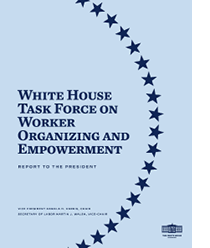Sources: Occupational Safety and Health Administration; CP staff The Occupational Safety and Health Administration is replacing traditional hard hats with safety helmets, citing greater protection prospects for inspectors while noting, “OSHA wants employers to make safety and health a core value in their workplaces and is committed to doing the same by leading by example and embracing the evolution of…
Read MoreTag: Bureau of Labor Statistics
The Latest on Construction Industry Employment
by Pierre G. Villere Among the most frustrating aspects of life as we went through the pandemic, and which haunts us still today, is the employment picture. There is no minimizing the magnitude of the human tragedy, with an official tally of over 5.2 million hospital admissions and a stunning 1.04 million deaths; the sheer human loss is unspeakable. But…
Read MoreABC counters administration’s PLA, union organizing push
In light of White House “Build Back Better” ambitions, Associated Builders and Contractors Vice President of Regulatory, Labor and State Affairs Ben Brubeck questions a new executive order encouraging project labor agreement (PLA) mandates on federal construction contracts exceeding $35 million. “The policy will not help America; instead, it will exacerbate the industry’s skilled workforce shortage, needlessly increase construction costs…
Read MorePandemic effects slightly skew 2020 union membership rates
Sources: U.S. Bureau of Labor Statistics; CP staff Wage and salary workers who were members of unions represented 10.8 percent of the 2020 workforce, a 0.5 percent year-over-year gain, the Bureau of Labor Statistics reports. In construction, the union membership rate rose 0.1 point, to 12.8 percent or 1.05 million workers, over the same period.
Read MoreBureau of Labor Statistics confirms unions’ erosion of workforce share
The 14.7 million wage and salary workers who were members of unions in 2018 represented 10.5 percent of the U.S. workforce, down 0.2 percent year-over-year, a Bureau of Labor Statistics report confirms. The figure underscores a protracted union membership rate decline since 1983, the first year for which comparable worker data are available. BLS calculated a rank-and-file of 17.7 million workers that year, or 20.1 percent of the wage and salary workforce.
Read MoreUnions’ share of U.S. workforce falls farther
Sources: U.S. Bureau of Labor Statistics; CP staff
The 14.7 million wage and salary workers who were members of unions in 2018 represented 10.5 percent of the U.S. workforce, down 0.2 percent year-over-year, a Bureau of Labor Statistics report confirms. The figure underscores a sustained union membership rate decline since 1983, the first year for which comparable worker data are available. BLS calculated a rank-and-file of 17.7 million workers that year, or 20.1 percent of the wage and salary workforce.
Read MoreLawmaker trains on Davis-Bacon prevailing wage calculation
Sources: Associated Builders & Contractors, Washington, D.C.; CP staff
Adding to an early-2017 bill targeting the 1931 Davis-Bacon Act, Senator Jeff Flake (R-AZ) has introduced The Opportunity in Federal Construction Act (S. 1200), which directs the U.S. Department of Labor (DOL) to use Bureau of Labor Statistics (BLS) data to calculate prevailing wages for federal and federally assisted construction projects. A BLS data method would replace the current practice of relying on the DOL Wage and Hour Division to calculate Davis-Bacon-bound job wage levels.
Read MoreConstruction trades’ unionization rate continues slide
Sources: U.S. Department of Labor, Bureau of Labor Statistics; CP staff
Bureau of Labor Statistics figures show the percentage of U.S. construction workers belonging to unions dropped from 13.9 in 2014 to 13.2 last year. The figures are based on rank-and-file totals of 968,000 and 940,000 against 2014 and 2015 workforces, respectively, of 6.97 million and 7.1 million. The total percentage of construction workers represented by unions—local or association members plus workers whose jobs are covered by a union contract—was 14.7 and 14.0 for 2014 and 2015.
Read MoreFatal workplace injury rate rises slightly in new BLS Census
A preliminary total of 4,679 fatal work injuries recorded in the U.S. during 2014 marks a 2 percent increase over prior year figures, according to the U.S. Bureau of Labor Statistics Census of Fatal Occupational Injuries. Preliminary 2014 figures show a fatal work injury rate at 3.3 per 100,000 full-time equivalent (FTE) workers, matching the 2013 level.
Read MoreConstruction industry pledges to hire more than 100,000 veterans
Source: U.S. Department of Labor
During A National Symposium: Veterans’ Employment in Construction, a February 9 gathering in Washington, D.C., First Lady Michelle Obama and Labor Secretary Thomas Perez celebrated a broad coalition of construction employers and associations that have collectively pledged to hire 100,000 veterans over the next five years.
Read More